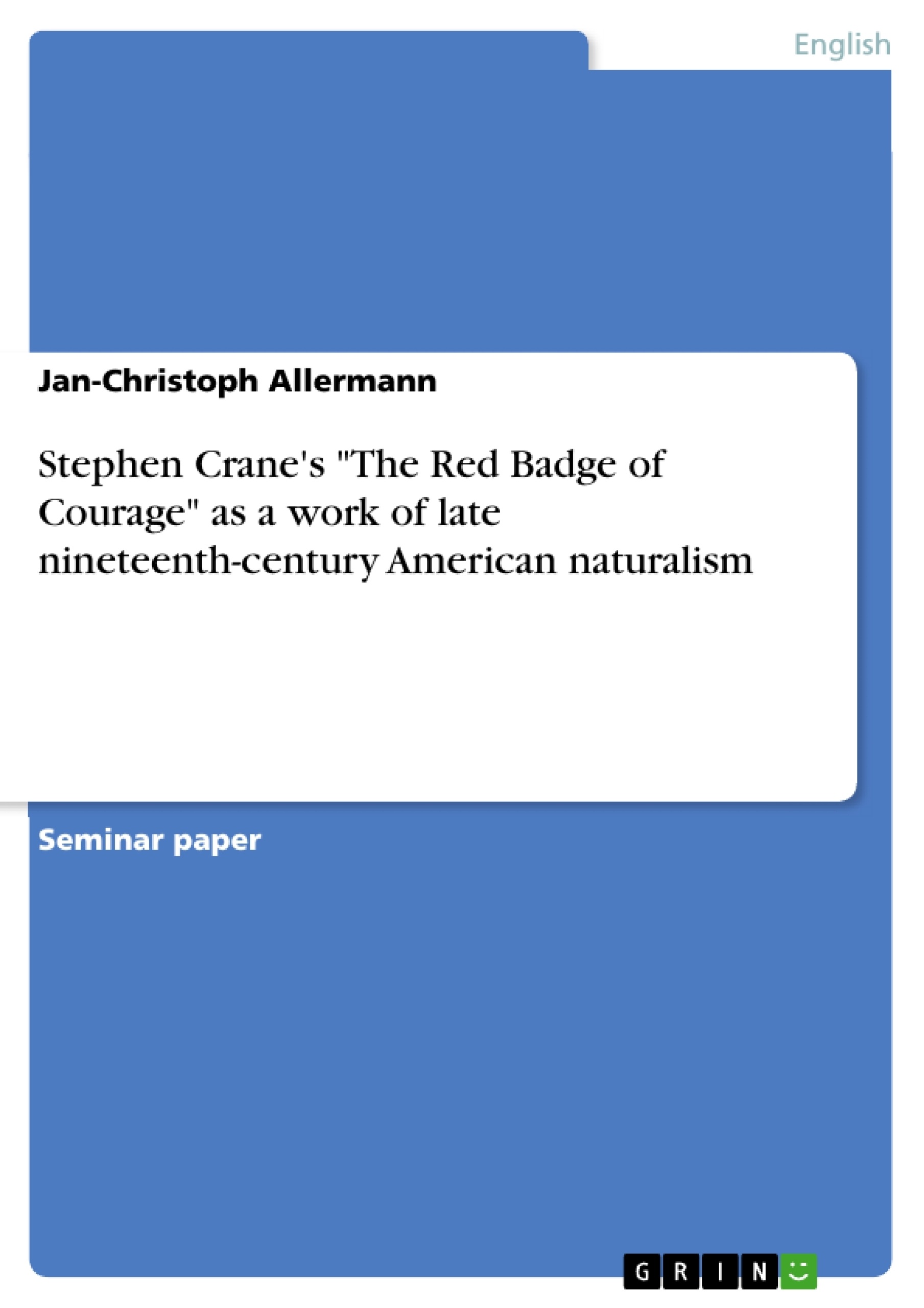Excerpt
Table of contents
1. Introduction
2. Naturalism
2.1 The origin of naturalism
2.2 Definition of “Late Nineteenth-Century American Naturalism”
3. Elements of naturalism in The Red Badge of Courage
3.1 Lower and middle class characters
3.2 The fictional world of the commonplace and unheroic
3.3 Henry Flemming controlled by instinct, environment and chance
4. Conclusion
5. Bibliography
1. Introduction
When it comes to American War Writing there are several important writers which come to ones mind. One writer, however, who will most probably always be among them, is Stephen Crane. Although his “[…] contribution to the canon of American literature is fairly slight in bulk: one classic short novel, three vivid stories, and two or three ironic lyrics”[1], he has achieved something very remarkable. “[...] Crane, who later saw warfare in Cuba and between the Greeks and the Turks in his work as a correspondent, had experienced no fighting when he wrote The Red Badge of Courage.”[2] “Yet anyone who has gone through warfare, from the time of the novel’s publication (1895) until now, has testified to Crane’s uncanny accuracy at the representation of battle.”[3] The fact that Crane’s imaginative vision is so compatible with real-life experiences of people who have witnessed battle left foremost British and later on American critics in awe and quickly established his reputation as an author. Soon after its publication The Red Badge of Courage became a bestseller.[4]
While some people merely enjoy the book as a good read, others have digged deeper into the world of Stephen Crane in order to analyse his masterpiece. Thus it comes as no surprise that there are plenty of academic essays and reviews which deal with The Red Badge of Courage. One thing that is conspicuous throughout these essays and reviews is the ongoing discussion of whether the corresponding literary movement is actually naturalism. “Stephen Crane’s admirers regularly deny he is a naturalist out of what appears to be a fear of linking him with a circle of ´bad` writers.”[5]
For a better understanding of their fear one should know that “American literary naturalism has almost always been viewed with hostility.”[6] But there are also those who state that “Stephen Crane will always be identified with literary naturalism.”[7]
To throw light on the matter I will discuss, in this term paper, whether the novel contains any elements of naturalism. Beforehand I will briefly touch on the origin of naturalism and its evolvement and I will highlight the difficulties in defining the term of literary naturalism.
2. Naturalism
2.1 The origin of naturalism
Given the significance of Crane and his novel it would be useful to introduce this major movement in American literary history with a short glance at the origin of literary naturalism and how it did evolve. Literary naturalism began in Europe in the mid-nineteenth century. “While naturalism in America may not be directly traceable to any one particular national philosophy, character, or attitude, all observers agree that naturalism reached its apogee in France […].”[8] The central figure of French naturalism was the well known novelist and critic Émile Zola. “Throughout his Rougon-Macquart series, he portrayed French life in its entirety through a detailed yet passionate study of a family seen in the light of its environment and heredity.”[9] “There was no American novelist who covered the panorama of economic activity of a Zola.”[10] But when we compare the history of both countries we discover that “the aftermath of the Civil War in America parallels the kind of historical changes taking place in France between 1848 and 1870 as both economies moved from a landed to a commercial/industrial world.”[11]
At that time science was developed and American cities were growing rapidly. In particular “the feeling of despair, brought about by science, can be found both in Europe and America.”[12] “In America […] the works of naturalists were facilitated by the same tradition carried over from Europe and developed further in native soil.”[13] As Hakutani and Lewis further point out, “the transplanting of naturalism from Europe to the United States was thus inevitable.”[14]
Nonetheless, one should bear in mind that “naturalism appeared thirty years later in American literature than it did in Europe and it was never quite the same movement.”[15]
[...]
[1] Bloom, Harold. „Introduction.“ Bloom’s Period Studies. American Naturalism. Harold Bloom, ed. Philadelphia: Chelsea House Publishers, 2004. pp. 1-20.
[2] Bloom, 1.
[3] Bloom, 1.
[4] Richard M. Weatherford, ed. Stephen Crane. The Critical Heritage. London and Boston: Routledge & Kegan Paul, 1973. p. 5.
[5] Mitchell, Lee Clark. Determined Fictions. American Literary Naturalism. New York: Columbia University Press, 1989. p 96.
[6] Pizer, Donald. Realism and Naturalism in Nineteenth-Century American Literature. Carbondale: Southern Illinois University Press, 1984. p. 41.
[7] Gullason, Thomas A. „Stephen Crane: In Nature’s Bosom.” American Literary Naturalism: A Reassessment. Yoshinobu Hakutani, Lewis Fried, eds. Heidelberg: Carl Winter Universitätsverlag, 1975. pp. 37-56.
[8] Hakutani, Yoshinobu and Fried, Lewis. „Introduction” American Literary Naturalism: A Reassessment. Yoshinobu Hakutani, Lewis Fried, eds. Heidelberg: Carl Winter Universitätsverlag, 1975. pp. 1-10.
[9] Hakutani and Lewis, 3.
[10] Lehan, Richard. „American Literary Naturalism: The French Connection.” Bloom’s Period Studies. American Naturalism. Harold Bloom, ed. Philadelphia: Chelsea House Publishers, 2004. pp. 177-201.
[11] Lehan, 190.
[12] Hakutani and Lewis, 5.
[13] Hakutani and Lewis, 5.
[14] Hakutani and Lewis, 5.
[15] Cowley, Malcolm. „Naturalism in American Literature.“ Bloom’s Period Studies. American Naturalism. Harold Bloom, ed. Philadelphia: Chelsea House Publishers, 2004. pp. 49-80.
- Quote paper
- Jan-Christoph Allermann (Author), 2006, Stephen Crane's "The Red Badge of Courage" as a work of late nineteenth-century American naturalism, Munich, GRIN Verlag, https://www.grin.com/document/73483
Publish now - it's free






















Comments